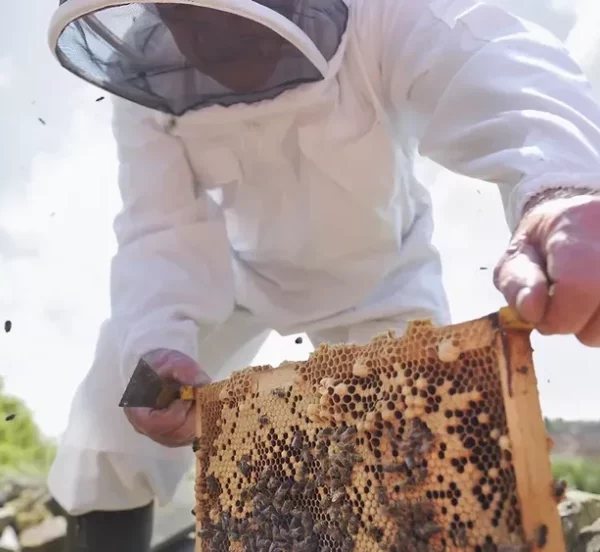Challenges for Biodiversity #2
Cyprus has a long tradition of honey production. After a deadly fire during the summer of 2021, 75% of the hives and millions of bees were lost. To revive the destroyed ecosystem, the Queen Bee Artificial Breeding Center “Melissa Life” was established in Odous. It is one of the villages in the Limassol mountains affected by the fires, in the south of the island.
In July 2021, one of the worst fires in the island's history broke out in Cyprus, leaving behind 4 dead, many homeless, destroyed property, and 5,500 hectares of burned land. About a year later, in June 2022, thanks to the initiative of the Bank of Cyprus and Rotary clubs, the Queen Bee Artificial Breeding Center “Melissa Life” was inaugurated. Its function is to revive nature and the communities that have suffered environmentally, economically, and professionally.
A Bee That Gives Hope
“The day after the devastating fires, we went to the affected villages to assess the specific needs that had emerged. After holding several meetings with the village leaders [NC1] in the area, a collateral victim was identified: the bee. Indeed, 75% of the hives in this region were destroyed and millions of bees were lost due to the fires,” explains Elli Ioannidou, Director of Corporate Social Responsibility at the Bank of Cyprus. The Center aims to support the local economy by helping to recover not only honey production but also related agricultural products,” she emphasizes. Before detailing: “Nine communities and 38 small and medium-sized honey production enterprises benefit from the Center's expertise.”
The Crucial Role of the Melissa Life Center
During the period of the fires and the establishment of the breeding center, Menelaos Philippou was the President of the Community Council of the village of Odous. A professional beekeeper and farmer, he indicates that the Center plays a crucial role in the recovery not only of honey production but also of general agricultural activity.
“We provide expertise for artificial breeding of queens, a space for the storage of breeding machines, equipment for free analyses to all businesses affected by the fires operating in the honey production sector, and free training by qualified professors from foreign universities. The “Melissa Life” Center helps in the restructuring of hives and the increase of biodiversity. The small and medium-sized beekeeping enterprises in the villages affected by the fires benefit: Arakapas, Melini, Ora, Odous, Eptagonia, Sycopetra, Agioi Vavatsinia, and Vavatsinia”.
For Mr. Philippou, a significant portion of honey production has been recovered. However, it remains low compared to previous years, mainly due to the lack of rainfall last winter, which limited the development of flora and nectar collection by bees. “The yield is also affected by other factors such as bee diseases and weather conditions”.
“This action has brought us closer to the local residents and even more to the honey producers, as additional collaborations have emerged between us. This includes organizing educational visits to honey production workshops for the children of Bank staff, offering honey-derived products as corporate gifts from the Bank to partners and clients… Or highlighting the nutritional value of these products through social media,” notes Ms. Ioannidou.
The Immense Contribution of Bees to Humanity
According to the Food and Agriculture Organization of the United Nations, the National Institute for Agricultural Research of France has estimated the contribution of pollinators to global agriculture at over $200 billion per year. Although they are essential for the planet's ecosystems, the services that bees and other pollinators freely provide to agriculture were once taken for granted, which is no longer necessarily the case today.
“Bees are irreplaceable for maintaining biodiversity, pollinating plants, and ensuring the food chain,” insists Menelaos Philippou. “About 75% of crops depend on bee pollination. They are therefore essential not only for agriculture, but also for the sustainability of the ecosystem. That is why it is our duty to protect bees, the environment, and our planet, ensuring a sustainable life for future generations!”, he concludes.

Featured Photo: About 75% of crops depend on pollination by bees. @cybeeas
